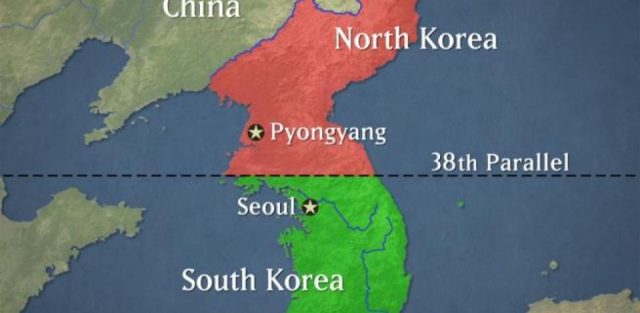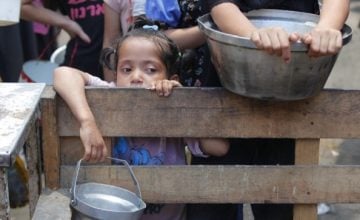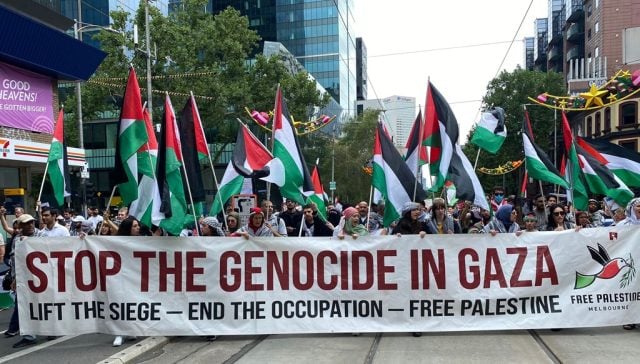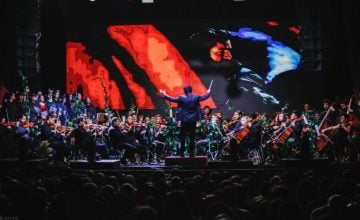By Maria Sanhueza
In a context that many experts call as a Cold War 2.0, it is necessary to review the historical and ideological background of what is known as the traditional Cold War, both as to differentiate as to distinguish the specificity of this new configuration.
Although, in the western hemisphere, we lived the cold war (this is how most of the
Historiography describes it) as a dispute between two superpowers leading two poles of influence, the situation in East Asia (the place where the largest number of inhabitants of the planet live) can be understood in a very different way. On the one hand, in East Asia, this conflict was not experienced as a duality, but rather as a triad, with China playing a predominant role in this confrontation, and exploiting the dispute between both powers to get her own political independence and positioning herself as an alternative between the two blocks led by the USA and USSR, respectively. On the other hand, the so-called «cold war» in East Asia, it was rather a hot war, with strong military clashes that could have escalated into a third world war.
A particularly interesting case to analyze this configuration, with deeper historical roots is the case of the Korean peninsula. A place in which we saw one of the sharpest conflict between the leading powers during the Cold War, the Korean War. A confrontation that not only left more than 3,500,000 people dead and a totally destroyed country, but it could have escalated into a third world war. A dispute that has not ended to date. This nuclear-capable peninsula remains divided into two parts ideologically opposed, which in turn are associated with two blocks that dispute the control of the region and from different spheres of influence in the world.
To analyze the situation of the Korean peninsula, especially North Korea, its history and political divergences, can be very useful in understanding this new context of the cold war 2.0 and the possible constellations of a region, which today has become one the focuses of geopolitical conflict. To delve into this analysis we have talked with the renowned economist, specialist in Korea and leading scholar at the University of Vienna, Professor Frank Rüdiger, about the current moment of the peninsula and geopolitics in the context of crisis and new confrontations between the superpowers.
1) The Biden administration has promoted a much more aggressive policy towards North Korea than his predecessor has. North Korea seems to be reacting accordingly with this aggressiveness. How do you observe this change in the USA-North Korea relationship from the perspective of the political class in North Korea?
RF: I do not see much of a change in North Korea’s attitude towards the United States. The leadership in Pyongyang understands quite well that it has to deal with a new leader in the White House every four or eight years. They have seen that commitments made by a president often do not last very long as soon as he has been succeeded by a political opponent. The approach taken by North Korea is therefore to focus on its own long-term strategic goals and tactically adjust their short-term implementation to whoever is currently the US president.
2) With the Ukraine war, we have come to understand that the foundation of the political configuration of the world, after the Cold War ended, was much more fragile than assumed, and based on the premise of having a single superpower. This premise has been questioned (as we are observing now), from the so-called «Emergent Powers”. How do you see North Korea positioning herself in this changing world-order?
RF: The evaluation of the current geopolitical situation depends on perspective. To me, all we see is the end of an extraordinary and relatively short era of only three decades, and the return to something that has been there before, more or less. In other words, if we take a long-term perspective, we rather see a return to normality. My analysis of North Korea’s approach to strategy suggests that they take such a long-term perspective. Accordingly, North Korea will do two things: (1) build its alliance with China and Russia to benefit economically and militarily, while at the same time using its nuclear program and occasional talks with the United States to keep these allies at a comfortable distance. The last thing the North Koreans want is to become a colony or a subordinate again, so that they will repeat what they had already done since the 1950s – benefit as much as possible from being part of a bloc, while at the same time keeping their own commitment to an absolute minimum. The other strategy, as we also know it from the first Cold War, is (2) building close ties with other smaller countries. In the past, North Korea had tried to export its chuch’e ideology to revolutionary states in Southeast Asia, Africa, and Latin America, and to establish itself as a leader within the Non-Aligned Movement. It is very likely that they will try something similar again, under the term “South-South Relations”. Let me repeat that nothing of this would be new, if we look back further than just the last 30 years.
3) Being a North Korea expert and German citizen, who grew up in the DDR, you are very familiar with the reality of the Cold War. In your opinion, does the concept of a «new Cold War» describe the current global state of affairs?
RF: The environment is very different, and so are the details. A key difference is the fact that China and Russia are now also de facto market economies, albeit with a strong state. But yes, I do think that we are entering what I called “Cold War 2.0” during a public debate at the World Economic Forum in Manila in 2014 (starts at minute 4 here: http://webcasts.weforum.org/widget/1/philippines2014?p=1&pi=1&a=57124). Why? Because we see the emergence of two blocs who are strongly antagonistic against each other, while at the same time trying to build maximal coherence internally. These blocs are heavily based on ideology again. However, this time, it is not “Communism versus Capitalism”, but rather “authoritarianism versus democracy”. As during the first Cold War, these blocs demand loyalty from their members, and actively lobby other countries to join. China is doing this for example with its Belt-And Road-Initiative, and Russia is actively building military and economic alliance structures in particular in Central Asia. The UN will again become one of the stages for this game. On a side note, I am pretty sure that Mexico’s position in any negotiations with the USA has just become much stronger due to the same logic.
4) People from the west, oftentimes, assumes that the relationship between China and North Korea is much smoother, than in facts is (the same goes for the Sino-Russian relationships). When in reality it is a lot more complicated (I learned this with your guidance). It also has a much more complex historical context than we think or are aware of, which amounts for hundreds and hundreds of years. How do you evaluate the Chinese-North Korean relationships at this moment?
RF: Relationships between neighboring countries often tend to be complicated; China and Korea are no exception. The big issue is usually that the stronger partner expects loyalty, while the weaker partner is concerned about the “embrace” by the big ally becoming too tight, leading to a loss of its independence. The result is a continuous process of cooperation and disruption, of negotiations, back and forth. At times, this can look like close friendship, and sometimes it can look like strong antagonism. All these short-term developments aside, the reality of the bilateral relationship between China and North Korea is somewhere in the middle. They are partners, nothing more and nothing less. They share a similar ideology, they have joint enemies, and they have no illusions over who of both is stronger. China has helped North Korea during the Korean War, that is true. However, this support was given not least to avoid a US invasion of Manchuria, which could have become the next step. The same logic applies now. A destabilization in North Korea would create a wide range of big problems for China, and it could trigger another war on the peninsula that can easily get out of control. Just look at how the conflict in Ukraine threatens to develop into World War 3. China wants a stable, friendly country at its border. Apart from such pragmatic considerations, supporting North Korea now again becomes a matter of principle in the context of the new Cold War. Camps and blocs only function if they demonstrate coherence and solidarity. A key difference compared to the past is that North Korea now has nuclear weapons; they are a major factor to guarantee its independence from China.
5) It seems as if the project of globalization would be having serious problems, some experts even talk about its end. The chain of supplies cannot be guaranteed anymore, and this situation seems to get worse after the war in Ukraine started. The conflict between the USA and China in the South Pacific seems to worsen and move towards the direction of Decoupling. According to this context, North Korea, which is much less dependent on the chain of supply and the technology industry, than most of the countries, but specially South Korea could have an advantage in terms of overcoming this crisis with the same political form. Do you see North Korea as being more resilient to this global crisis due to the «backwardness» on its economy( we could actually also called it sustainable, although this would not fit the mainstream speech)?
RF: I do not think that such major trends often really come to an end. I like to think of them more like a pendulum: it swings in one direction, then it swings back, and then it starts again. True, right now we see a resurgence of economic nationalism, protectionism, and even attempts of autarky; it is almost as if North Korea’s chuch’e ideology has become the new global standard. Needless to say, that a country that had been internationally isolated is less affected than a country that has made export-orientation a key component of its economic model. What matters is the price paid for such a policy, measured in life expectancy, GDP per capita, or other indicators. There are few economies in the world that are big enough to be really self-sustainable if they want to grow. Globalization has led to immense gains. It has also led to many problems including uneven distribution of gains and losses, environmental destruction, and social disruptions. Its weaknesses and risks have been exposed very clearly, especially since the Covid pandemic and the war in Ukraine. But if we want to keep living better and better, then there is no alternative to trade and a global supply chain. I think we will eventually see a return of globalization – hopefully including some improvement based on learning from past mistakes. But right now, things are getting worse, and countries with little international exposure suffer less. This is a bit like Japan going comparatively smoothly through the global financial crisis in 2008 due to its dependence on domestic sources of finance.
6) Being in the middle of a serious food crisis, could you tell us a bit about the predominance of the agricultural sector in North Korea, and how they organize their agricultural practices? Could we (still) talk about North Korea as an agriculture predominant society?
RF: North Korea is an industrialized country. The reason why about 30% of the population still work as farmers is that the country tries to be self-sufficient in food for strategic reasons, and that it can only do so with a huge input of manual labor. Under normal circumstances, North Korea would focus on producing minerals and manufactured goods, exporting or re-exporting these, and using the revenue to purchase consumer goods and food elsewhere. Right now, North Korea is very obviously acting against its comparative advantage. Geography and climate are not optimal for agriculture. Look at South Korea, where these conditions are much better than in the north; it used to be the granary during the Japanese colonial time but has shifted to industrial production and services. Farming in South Korea still takes place but at a much lower level, and often in cash crops or only thanks to heavy subsidies. The key problems of North Korea’s agriculture are well known and understood. Lack of oil means a lack of fertilizer and therefore lower yields; lack of machinery means a predominance of unproductive manual labor; the lack of adequate storage facilities means huge post-harvest losses. North Korean farmers work very hard to overcome these problems, but there are limitations. If North Korea is able to import enough oil or fertilizer again, if it has the economic power to build or import more farming machines, and if they have enough electricity and other technology to ensure professional drying and storage, and if they generate enough hard currency to import food if needed, then the size of the labor force in agriculture will decrease, productivity will increase, and food problems will be an issue of the past. These are many “ifs”, however. We also need to consider that the North Korean leadership seems to still prioritize its military, so that agriculture is indirectly subsidizing the defense budget.
7) In this context of the food crisis and global economic crisis, North Korea could be potentially less affected than other market-oriented economies, such as South Korea. Do you think that this could affect their power-relationships? The configuration of them?
RF: One big strength of market-oriented economies is that they are able to react to changing circumstances very quickly. Yes, we have a crisis now, and it is likely to get worse. This is bad, but it is not the first crisis the world has experienced. Each time, lessons were learned, new opportunities emerged, and creative new solutions were found. Many countries are now rethinking their economic policies, and most people are mainly paying attention to their governments in hope for a solution. But the state is only an administration, a politically driven bureaucracy. The real solution is to be found in the decentralized reaction of thousands of businesses. If certain imports are no longer available or become too expensive, then this opens new opportunities for domestic production. If certain inputs cannot be produced domestically at all, but there is still a high readiness to pay for them, then this provides a huge incentive for innovation. Frankly, I have the impression that many people these days have forgotten about the basic strengths of a market-based economy, because we have gotten so used to it. The state’s role is to provide a stable and fair environment, and to ensure social justice through redistribution. But the economic engine of a country are its many businesses. This is also the reason why I think that a market economy like that of South Korea will in the long run always be superior to a state-owned economy like that of North Korea. This is something I learned from having lived in a state-socialist country. I am not talking about ideology here, just about pure efficiency.
8) Before the Pandemic broke out, we could observe many important changes in North Korea, especially in the economic sector; something that was described as «opening out», where is the stand of these changes within the context of the pandemic, as we hear that North Korea isolated itself due to the outbreak of the Coronavirus within its borders.
RF: I have studied these economic adjustments in North Korea for over 20 years now, starting with the July reforms of 2002. I compared them to the situation as I witnessed it in North Korea when I lived there in 1991~1992, and I compared them to what had happened in China since 1978, in Vietnam since 1979, and of course in Eastern Europe since the 1980s. The one thing I had always been missing in North Korea was a public announcement of an economic reform by the top leader. Neither Kim Jong-il nor Kim Jong-un had ever officially and explicitly started a reform drive. In that sense, North Korea had nothing like “reform and opening” under Deng Xiaoping, “glasnost and perestroika” under Mikhail Gorbachev, or “Doi Moi” in Vietnam. I have been waiting and waiting, reading the leader’s speeches for the New Year or at major events like Party Congresses, but – nothing, except for a few implicit indications.
My conclusion is: North Korea’s leadership has never embraced economic reforms as a long-term policy. They did allow changes, but these were meant to be a short-term measure to overcome difficulties. They were not a new paradigm. Therefore, it is only logical that now, as North Korea can expect to be able to rely on economic support from China and Russia again, there is no need anymore for such reforms and their risks. Like all rational humans, the North Korean leaders go for the low-hanging fruits first – and these are now right in front of them, easy to reach. Marketization has led to the emergence of a new middle class in North Korea; an expansion of trade and tourism has led to more external information flowing into the country. This was the political price to pay for economic gains. Now these gains can be generated without that political price. Accordingly, North Korea’s leadership is trying to undo some of the previous changes, and is stepping up its ideological campaign against “anti-socialist and non-socialist behavior”, as they call it. We will have to see how successful this will be, since experience tells me that it is very difficult to take back ideological control once it has been loosened. But as a matter of fact, the current trend in North Korea’s economic policy as announced by Kim Jong-un at the 8th Party Congress are: (1) import substitution and (2) a strengthening of the role of the state in the economy. Under the current conditions of Cold War 2.0, this can even be successful – at least for a while.
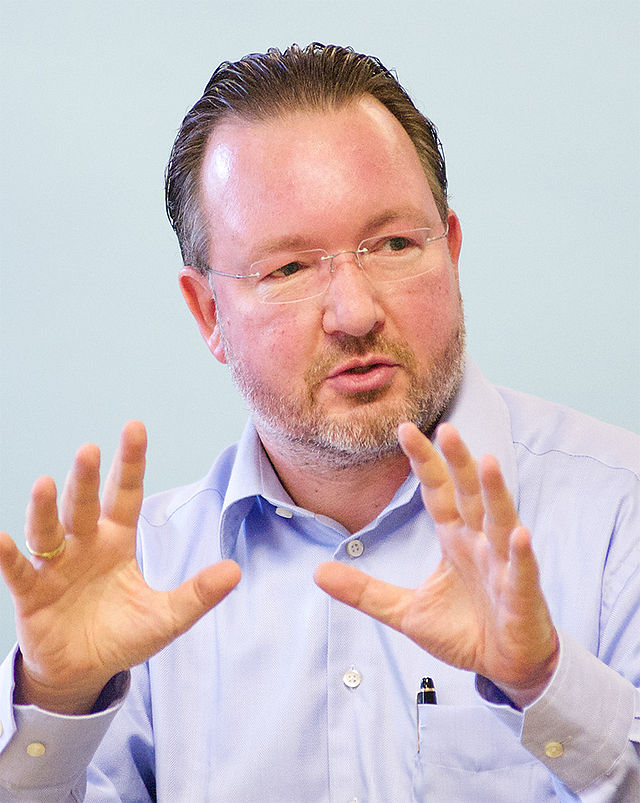
Dr. Ruediger FRANK is Professor of East Asian Economy and Society at the University of Vienna, where he is also Director of the European Center for North Korean Studies. He holds an MA in Korean Studies and International Relations, and a PhD in Economics. He has been working in various Korea-related councils of the World Economic Forum and was named one of the 50 most influential German economists by the Frankfurter Allgemeine Zeitung in 2012. He tweets as @RFrankVienna.
